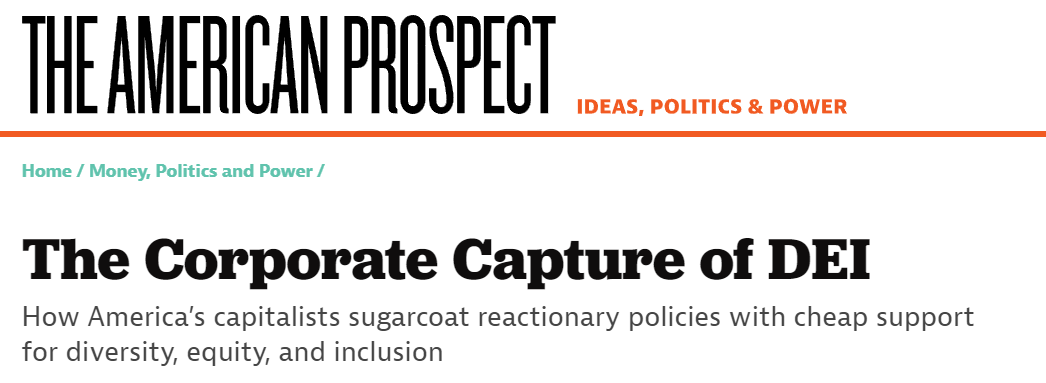Welcome to DU!
The truly grassroots left-of-center political community where regular people, not algorithms, drive the discussions and set the standards.
Join the community:
Create a free account
Support DU (and get rid of ads!):
Become a Star Member
Latest Breaking News
General Discussion
The DU Lounge
All Forums
Issue Forums
Culture Forums
Alliance Forums
Region Forums
Support Forums
Help & Search
General Discussion
Related: Editorials & Other Articles, Issue Forums, Alliance Forums, Region ForumsThe Corporate Capture of DEI

https://prospect.org/power/2023-10-24-corporate-capture-of-dei/

The DEI movement is a mixed blessing for the long-term project of advancing civil rights and tolerance. On the one hand, it’s clear that traditional affirmative action is not the same as genuine welcome, inclusion, and power-sharing. And while demands for alertness to microaggressions and language policing can sometimes border on self-parody, the casual insensitivity among the privileged to the feelings and needs of non-whites, non-males, and non-straights is all too real. But on the other hand, it seems as if some of the left is focusing on rarified realms of hypersensitivity when the house is burning down. While the DEI movement has been gaining ground among progressives, dozens of states are explicitly repressing the more fundamental right to vote. Police violence against Black people continues unabated. Censorship of books and class curricula is increasing. The Supreme Court has invalidated even basic affirmative action and is close to holding that discrimination against gays is itself a civil right.
Meanwhile, the more precious versions of DEI turn the progressive community against itself and give ammunition to the right to ridicule liberals and the Democratic Party for “wokeism.” For Ibram X. Kendi, now at the center of a hot mess at Boston University, the core idea is that one is either a racist or an anti-racist. But surely there are gray areas. Don’t progressives have more urgent things to do than argue about that? A lot of this argument goes on in the rarified precincts of the elite academy and serves as a distraction from more effective ways to advance equity. Stanford, one of the nation’s wealthiest universities in terms of endowment per student ($5,969 million) ranks number 133 in the percentage of Pell grant–eligible (i.e., low-income) students in its freshman class, well below far less affluent universities.

The same Stanford was recently flamed last December for publishing one of the sillier guides to politically acceptable language, called the Elimination of Harmful Language Initiative. It gives hundreds of examples of words or phrases to avoid and suggests preferred euphemisms. Under the heading of “Ableist,” we are supposed to drop the word “addict” in favor of the circumlocution “person with a substance use disorder.” But the next edition will likely warn us against the value-laden word “disorder.” It would do far more for true diversity, equity, and inclusion if Stanford accepted and subsidized more low-income kids. Among well-meaning white liberals, policing language can be a form of what Protestant theologians call cheap grace.
Even worse, DEI can serve as a camouflage for corporations that are responsible for more fundamental forms of inequity. One sector of our society that knows all about cheap grace is corporate America. For instance, Vertex Pharmaceuticals pledged $1.5 million to Kendi’s center. Before Kendi’s high-profile struggles forced a cancellation, a Vertex symposium at Boston University this week was to explore “how communities, advocates, scholars, and policymakers are working at the intersection of abolition and public health to create an antiracist future.” Sounds great, but this is the same Vertex that has been widely criticized for the astronomical list price ($322,000 per year) for its Trikafta drug treatment for cystic fibrosis, a drug that nets Vertex $17 billion in annual sales, and is estimated to cost less than 2 percent of its list price to manufacture. The drug is not available in the (non-white) Global South at all.
snip
related:
Elexacaftor/tezacaftor/ivacaftor, sold under the brand names Trikafta (US) and Kaftrio (EU), is a fixed-dose combination medication used to treat cystic fibrosis.
https://www.nytimes.com/2023/02/07/health/cystic-fibrosis-drug-trikafta.html
Trikafta, taken as three tablets a day, is the most powerful and widely used of Vertex’s four cystic fibrosis medications. With a list price of over $322,000 annually in the United States, it is expected to cost millions of dollars over the course of a patient’s lifetime. An analysis led by researchers in Britain found that a year’s supply of the drug could be manufactured at an estimated cost of just $5,700.
Trikafta, taken as three tablets a day, is the most powerful and widely used of Vertex’s four cystic fibrosis medications. With a list price of over $322,000 annually in the United States, it is expected to cost millions of dollars over the course of a patient’s lifetime. An analysis led by researchers in Britain found that a year’s supply of the drug could be manufactured at an estimated cost of just $5,700.
InfoView thread info, including edit history
TrashPut this thread in your Trash Can (My DU » Trash Can)
BookmarkAdd this thread to your Bookmarks (My DU » Bookmarks)
1 replies, 297 views
ShareGet links to this post and/or share on social media
AlertAlert this post for a rule violation
PowersThere are no powers you can use on this post
EditCannot edit other people's posts
ReplyReply to this post
EditCannot edit other people's posts
Rec (2)
ReplyReply to this post
1 replies
 = new reply since forum marked as read
Highlight:
NoneDon't highlight anything
5 newestHighlight 5 most recent replies
= new reply since forum marked as read
Highlight:
NoneDon't highlight anything
5 newestHighlight 5 most recent replies
The Corporate Capture of DEI (Original Post)
Celerity
Oct 2023
OP
marble falls
(58,677 posts)1. What Shakespeare's first draft of Richard III said ...
"First we kill the lawyers, and then the pharmaceutical owners and businessmen!"

